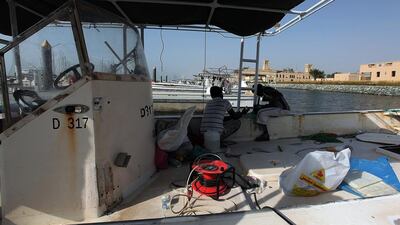DUBAI // Hundreds of fishermen say they have been forced to eat out at restaurants because they are not allowed to cook in their new apartment blocks, which were completed as part of a major redevelopment of the emirate’s harbours.
An ambitious project to transform and improve facilities at harbours along Dubai’s coast has been completed but not everyone is happy.
Although fishermen have welcomed their new living quarters, they say they would like to be able to cook for themselves.
Senior officials at Dubai Fishermen’s Cooperative Association (DFCA), however, said it was not possible to provide communal kitchens for the development because of safety reasons.
“The rooms are great,” said an Indian fisherman, who asked not to be named. “We used to be eight people in a room. Now we are four. There are decent areas to shower now.
“We have to eat only at a restaurant that has been set up close by.”
The cost of meals is about Dh8 and many do not like the taste, with some complaining of stomach aches, he said.
The Indian earns Dh1,000 a month and was moved to the new location in Jumeirah 4, which is home to about 800 men, six months ago.
“How can we afford to spend eight dirhams a meal if our salary is so little? How can we survive?” he asked.
Although he is out at sea for 20 days in a month, he says the 10 days he is at the accommodation is proving expensive.
“I skip breakfast and eat only lunch or dinner. Some people hide and cook but there are inspectors from the municipality who come for checks. If they catch you cooking, the fine is Dh500.”
The men said they had approached their Emirati captains to find a solution.
“We told them we can’t afford to pay so much for food,” said another fisherman, who also earns Dh1,000.
“A fight broke out here three months ago over the issue and the police were called. We were told that if we don’t want to eat here, we can go back to our countries.
“If we had kitchens where we could do our own cooking, we wouldn’t spend more than Dh100 or Dh150 a month. Many people are now considering quitting and going back home.”
He added that a few Emirati sponsors were paying for the fishermen’s food but most of them had to shell out the money themselves.
The fishermen are also banned from wearing lungis, a traditional Asian sarong-like garment worn around the waist, he said. “We have to always be dressed in T-shirts, pants or shorts. Otherwise, we are fined Dh500.”
Addressing the safety aspect of cooking in the new accommodation, Mohammed Al Marri, chairman of the DFCA, said: “We can’t have 300 gas cylinders in there. It could be dangerous.”
He said authorities wanted to provide a better quality of life for the fishermen and prevent cases of food poisoning. “It is the owner’s responsibility to provide food,” Mr Al Marri said. “If they don’t want to keep to our standards, they can leave.”
Mr Al Marri said the new harbours and facilities had given the port areas a facelift.
“The quality of the place, the facilities for parking boats and the new accommodation is great. It’s very nice and people are happy now.”
Khalid Al Falasi, general manager of the association agreed, saying it would be too dangerous to allow kitchens.
“The fishermen have been given some high-quality housing and in front there is an excellent five-star restaurant,” he said. “The chef is from the same nationality and the food is very reasonably priced.
“We have about 1,000 men in these apartments and there is about four or five to each room.
“It’s not possible to have a kitchen in the rooms because there is a safety issue. Imagine having gas cylinders in more than 500 rooms.
“There is no way we could have that kind of risk.”
Dubai Customs began the harbour project in 2008 at locations in Jumeirah 1, Umm Suqeim 1 and Umm Suqeim 2.
The work involved renovating harbours, a boatyard for fishing boats and another for yachts and recreational craft.
The fully operational boatyard has 466 anchorages, 348 for fishing boats and 119 for yachts and recreational boats.
Special fisheries, warehouses to store fishing tools, boat-repair workshops and two fish markets, one in Jumeirah 1 and the other in Umm Suqeim 1 have also been built.
A statement from Dubai Customs, which oversees the harbours, said that, from the first design stage, “dining facilities and kitchen as well as a recreation hall were proposed in an annexed building” but it did not say whether it is still planned to provide these facilities.
The authority also said lungis were not permitted “to maintain the appearance of Dubai”.
nhanif@thenational.ae
pkannan@thenational.ae

